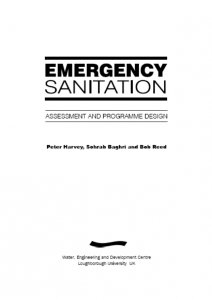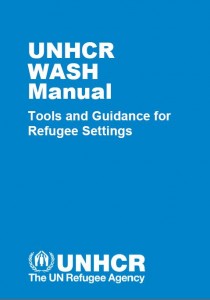
This document describes UNHCR’s global strategy for public health through a set of guiding principles and strategic approaches including protection; age, gender and diversity; equity; access; sustainability; community empowerment; appropriateness and reliability; partnerships and coordination; capacity building; communication and advocacy; integrated approaches; measurement and monitoring; and innovation. The document describes strategic objectives and enabling actions per sub-sector (Public Health, HIV and Reproductive Health, Food Security and Nutrition, and WASH).
Tags: Approvisionnement en Eau, Coordination EHA, Développement des Stratégies EHA, Droit à l'eau / assainissement, Genre, Gestion des Excréta, Lutte Antivectorielle, Optimisation des Ressources, Protection, Renforcement des Capacités, Santé Publique, Sensibilisation à l'Hygiène, Suivi et Evaluation EHA, and Violence Basée sur le Genre. Languages: Anglais. Organisations: UNHCR. Categories: Directives EHA, Directives Opérationnelles EHA, Documents de Référence EHA, and Principes directeurs EHA.

The book Emergency Sanitation: Assessment and programme design has been produced to assist those involved in planning and implementing emergency sanitation programmes. The main focus of the book is a systematic and structured approach to assessment and programme design. It provides a balance between the hardware (technical) and software (socio-cultural, institutional) aspects of sanitation programmes, and links short-term emergency response to long-term sustainability. The book is relevant to a wide range of emergency situations, including both natural and conflict-induced disasters, and open and closed settings. It is suitable for field technicians, engineers and hygiene promoters, as well as staff at agency headquarters.
Tags: Compostage des Excréta, Égouts et Acheminement des Excréta, Évaluations EHA, Gestion de Programmes EHA, Gestion des Excréta, Réutilisation des Excréta / Urine, Suivi et Evaluation EHA, Toilettes Communautaires, Toilettes Familiales, Traitement des Excréments, and Vidange et Transport d'Excréta. Languages: Anglais. Organisations: WEDC. Categories: Directives d'Urgence EHA and Documents de Référence EHA.

The Sphere Handbook is one of the most widely known and internationally recognized sets of common principles and universal minimum standards for the delivery of quality humanitarian response.
Tags: Accès pour Handicapés, Approvisionnement en Eau, Contrôle et Suivi de la Qualité de l'Eau, Coordination EHA, Douches, Droit à l'eau / assainissement, Écoulement des Eaux, Élimination des Eaux Usées, Environnement, Évaluations EHA, Genre, Gestion de l'Hygiène Menstruelle, Gestion de Programmes EHA, Gestion des Déchets Solides, Gestion des Excréta, Installations pour la Lessive, Lavage des Mains au Savon, Lutte Antivectorielle, Plans pour la Sécurité en Eau, Protection, Renforcement des Capacités, Réseaux d'Adduction d'Eau, Santé Publique, Sensibilisation à l'Hygiène, Suivi et Evaluation EHA, Thèmes Transversaux, Toilettes Communautaires, Traitement de l'Eau au Ménage, and Violence Basée sur le Genre. Languages: Anglais. Organisations: SPHERE. Categories: Documents de Référence EHA.

The UNHCR WASH Manual is a comprehensive and authoritative reference document for WASH interventions in refugee settings, built upon the experience of UNHCR and WASH organisations.
Tags: Accès pour Handicapés, Approvisionnement en Eau, Assainissement Total Piloté Par La Communauté, Camions Citerne, Changement de Comportement en Matière d'Hygiène, Collecte des Eaux de Pluie, Compostage des Excréta, Contrôle des Maladies Transmissibles, Contrôle et Suivi de la Qualité de l'Eau, Coordination EHA, Diarrhée Aqueuse, Diarrhée Sanglante, Douches, Droit à l'eau / assainissement, Écoulement des Eaux, Égouts et Acheminement des Excréta, Élimination des Eaux Usées, Évaluations EHA, Forages, Genre, Gestion de l'Hygiène Menstruelle, Gestion de Programmes EHA, Gestion des Décharges, Gestion des Déchets Médicaux, Gestion des Déchets Solides, Gestion des Excréta, Installations Adaptées aux Enfants, Installations pour la Lessive, Lavage des Mains au Savon, Lutte Antivectorielle, Malaria, Plans pour la Sécurité en Eau, Pompage d'Eau, Pompe Manuelle, Prospection d'Eau, Protection, Protection des Sources, Puits Creusés à la Main, Puits Forés, Recyclage, Réutilisation et Réduction des Déchets, Réseaux d'Adduction d'Eau, Réutilisation des Excréta / Urine, Santé et Sécurité, Santé Publique, Sensibilisation à l'Hygiène, Stockage de l'Eau, Suivi et Evaluation EHA, Thèmes Transversaux, Toilettes Communautaires, Toilettes Familiales, Traitement de l'Eau, Traitement de l'Eau au Ménage, Traitement des Excréments, and Vidange et Transport d'Excréta. Languages: Anglais. Organisations: UNHCR. Categories: Documents de Référence EHA.
 Français
Français




